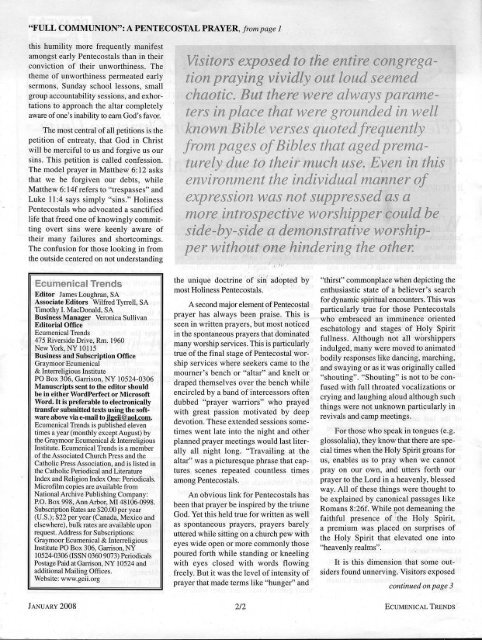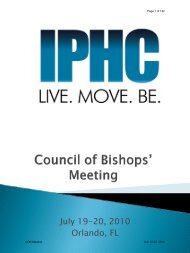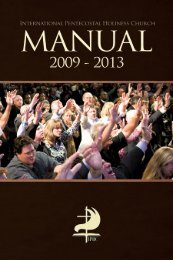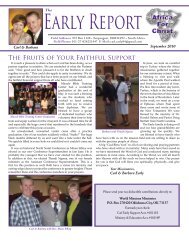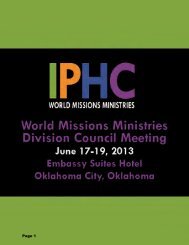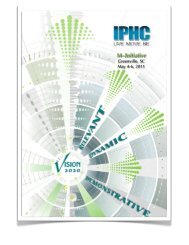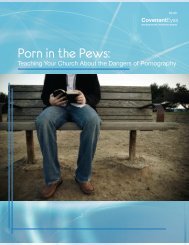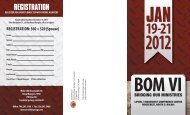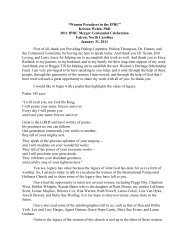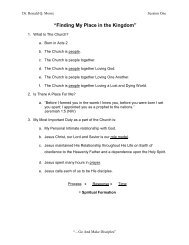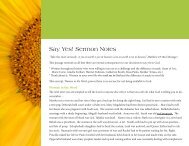"Full Communion": A Pentecostal Prayer - International Pentecostal ...
"Full Communion": A Pentecostal Prayer - International Pentecostal ...
"Full Communion": A Pentecostal Prayer - International Pentecostal ...
You also want an ePaper? Increase the reach of your titles
YUMPU automatically turns print PDFs into web optimized ePapers that Google loves.
"FULL COMMUNION": A PENTECOSTAL PRAYER, from page 1<br />
this humility more frequently manifest<br />
amongst early <strong>Pentecostal</strong>s than in their<br />
conviction of their unworthiness. The<br />
theme of unworthiness permeated early<br />
sermons, Sunday school lessons, small<br />
group accountability sessions, and exhortations<br />
to approach the altar completely<br />
aware of one's inability to earn God's favor.<br />
The most central of all petitions is the<br />
petition of entreaty, that God in Christ<br />
will be merciful to us and forgive us our<br />
sins. This petition is called confession.<br />
The model prayer in Matthew 6:12 asks<br />
that we be forgiven our debts, while<br />
Matthew 6:14f refers to "trespasses" and<br />
Luke 11:4 says simply "sins." Holiness<br />
<strong>Pentecostal</strong>s who advocated a sanctified<br />
life that freed one of knowingly committing<br />
overt sins were keenly aware of<br />
their many failures and shortcomings.<br />
The confusion for those looking in from<br />
the outside centered on not understanding<br />
Visitors exposed to the entire congregation<br />
praying vividly out loud seemed<br />
chaotic. But there were always parameters<br />
in place that were grounded in well<br />
known Bible verses quoted frequently<br />
from pI Ues of Bibles that aged premature<br />
l - their much use. Even in this<br />
e individual manner of<br />
. not suppressed as a<br />
wore iftitopective worshipper could be<br />
side-by-side a der 9e worshipper<br />
W hhov$ 01'<br />
^l^^rar<br />
F Rjmenicel Trends<br />
Editor James Loughran, SA<br />
Associate Editors Wilfred Tyrrell, SA<br />
Timothy I. MacDonald, SA<br />
Business Manager Veronica Sullivan<br />
Editorial Office<br />
Ecumenical Trends<br />
475 Riverside Drive, Rm. 1960<br />
New York, NY 10115<br />
Business and Subscription Office<br />
Graymoor Ecumenical<br />
& Interreligious Institute<br />
PO Box 306, Garrison, NY 10524-0306<br />
Manuscripts sent to the editor should<br />
be in either WordPerfect or Microsoft<br />
Word. It is preferable to electronically<br />
transfer submitted texts using the software<br />
above via e-mail to jl g ei@aol.com .<br />
Ecumenical Trends is published eleven<br />
times a year (monthly except August) by<br />
the Graymoor Ecumenical & Interreligious<br />
Institute. Ecumenical Trends is a member<br />
of the Associated Church Press and the<br />
Catholic Press Association, and is listed in<br />
the Catholic Periodical and Literature<br />
Index and Religion Index One: Periodicals.<br />
Microfilm copies are available from<br />
National Archive Publishing Company:<br />
P.O. Box 998, Ann Arbor, MI 481.06-0998.<br />
Subscription Rates are $20.00 per year<br />
(U.S.); $22 per year (Canada, Mexico and<br />
elsewhere), bulk rates are available upon<br />
request. Address for Subscriptions:<br />
Graymoor Ecumenical & Interreligious<br />
Institute PO Box 306, Garrison, NY<br />
10524-0306 (ISSN 0360 9073) Periodicals<br />
Postage Paid at Garrison, NY 10524 and<br />
additional Mailing Offices.<br />
Website: www.geii.org<br />
the unique doctrine of sin adopted by<br />
most Holiness <strong>Pentecostal</strong>s.<br />
A second major element of <strong>Pentecostal</strong><br />
prayer has always been praise. This is<br />
seen in written prayers, but most noticed<br />
in the spontaneous prayers that dominated<br />
many worship services. This is particularly<br />
true of the final stage of <strong>Pentecostal</strong> worship<br />
services where seekers came to the<br />
mourner's bench or "altar" and knelt or<br />
draped themselves over the bench while<br />
encircled by a band of intercessors often<br />
dubbed "prayer warriors" who prayed<br />
with great passion motivated by deep<br />
devotion. These extended sessions sometimes<br />
went late into the night and other<br />
planned prayer meetings would last literally<br />
all night long. "Travailing at the<br />
altar" was a picturesque phrase that captures<br />
scenes repeated countless times<br />
among <strong>Pentecostal</strong>s.<br />
An obvious link for <strong>Pentecostal</strong>s has<br />
been that prayer be inspired by the triune<br />
God. Yet this held true for written as well<br />
as spontaneous prayers, prayers barely<br />
uttered while sitting on a church pew with<br />
eyes wide open or more commonly those<br />
poured forth while standing or kneeling<br />
with eyes closed with words flowing<br />
freely. But it was the level of intensity of<br />
prayer that made terms like "hunger" and<br />
"thirst" commonplace when depicting the<br />
enthusiastic state of a believer's search<br />
for dynamic spiritual encounters. This was<br />
particularly true for those <strong>Pentecostal</strong>s<br />
who embraced an imminence oriented<br />
eschatology and stages of Holy Spirit<br />
fullness. Although not all worshippers<br />
indulged, many were moved to animated<br />
bodily responses like dancing, marching,<br />
and swaying or as it was originally called<br />
"shouting". "Shouting" is not to be confused<br />
with full throated vocalizations or<br />
crying and laughing aloud although such<br />
things were not unknown particularly in<br />
revivals and camp meetings.<br />
For those who speak in tongues (e.g.<br />
glossolalia), they know that there are special<br />
times when the Holy Spirit groans for<br />
us, enables us to pray when we cannot<br />
pray on our own, and utters forth our<br />
prayer to the Lord in a heavenly, blessed<br />
way. All of these things were thought to<br />
be explained by canonical passages like<br />
Romans 8:26f. While not demeaning the<br />
faithful presence of the Holy Spirit,<br />
a premium was placed on surprises of<br />
the Holy Spirit that elevated one into<br />
"heavenly realms".<br />
It is this dimension that some outsiders<br />
found unnerving. Visitors exposed<br />
continued on page 3<br />
JANUARY 2008 2/2 ECUMENICAL TRENDS


